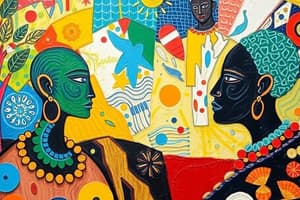Podcast
Questions and Answers
What is the nature vs. nurture debate?
What is the nature vs. nurture debate?
Nature refers to genetics that provide capacity, while nurture pertains to socialization that internalizes culture.
What is socialization?
What is socialization?
The process by which we gradually learn and internalize our culture to become functioning members of society.
How is socialization a two-fold process?
How is socialization a two-fold process?
It involves society teaching individuals to become members of society and individuals internalizing the values and norms of the group.
What are the goals of socialization?
What are the goals of socialization?
What do we know of the importance of socialization from cases of social isolation?
What do we know of the importance of socialization from cases of social isolation?
What do we know about adult socialization?
What do we know about adult socialization?
What is role exit?
What is role exit?
What is resocialization?
What is resocialization?
What is a total institution?
What is a total institution?
What are the characteristics of a total institution?
What are the characteristics of a total institution?
How would structural functionalists view the self?
How would structural functionalists view the self?
What is a status?
What is a status?
What are the three types of statuses?
What are the three types of statuses?
What is a role?
What is a role?
What is role conflict?
What is role conflict?
What is role strain?
What is role strain?
How do symbolic interactionists view the self?
How do symbolic interactionists view the self?
What is the self?
What is the self?
What is Freud's theory of self (id, ego, superego)?
What is Freud's theory of self (id, ego, superego)?
What is Cooley's concept of the looking-glass self?
What is Cooley's concept of the looking-glass self?
What are the 3 steps of the looking-glass self concept?
What are the 3 steps of the looking-glass self concept?
What do we need to remember about the looking-glass self?
What do we need to remember about the looking-glass self?
What is Mead's view of the self?
What is Mead's view of the self?
What are the characteristics of Mead's 3 stages of development?
What are the characteristics of Mead's 3 stages of development?
Flashcards are hidden until you start studying
Study Notes
Nature vs. Nurture Debate
- Nature involves genetics that provide potential, whereas nurture pertains to socialization that fulfills this potential.
Socialization
- A gradual process through which individuals learn and internalize their culture, enabling them to become functioning members of society.
Two-Fold Process of Socialization
- Society teaches individuals to integrate into the community.
- Individuals internalize group values and norms, affecting both personal and societal levels.
Goals of Socialization
- Equips members with essential skills for survival and societal continuity.
- Imparts cultural norms, values, and beliefs, promoting adherence to shared lifestyles.
Importance of Socialization
- Cases of social isolation highlight the necessity of social interaction for the development of human qualities.
Adult Socialization
- Occurs through various life stages such as education, work, and family.
- Adults constantly face new social roles, indicating that they are never fully socialized.
Role Exit
- The process of leaving a social role, which may require resocialization.
Resocialization
- Involves adopting new norms, values, and beliefs, leading to the formation of a new identity.
Total Institution
- An entity that facilitates resocialization by isolating individuals from society and managing their behavior.
Characteristics of a Total Institution
- Operates under controlled and regulated conditions.
Structural Functionalism and Self
- Views stability in society as reliant on the status and roles of individuals.
Status
- Refers to a position within a social hierarchy with specific expectations.
Types of Statuses
- Ascribed: innate traits assigned at birth.
- Embodied: derived from physical attributes.
- Achieved: obtained through individual effort or societal imposition.
Role
- Comprises expected behaviors linked to an individual's status.
Role Conflict
- Arises when a person faces competing demands from multiple statuses.
Role Strain
- Occurs when demands within a single status are overwhelming.
Symbolic Interactionism and Self
- Suggests that the self is developed through interactions with others.
Understanding the Self
- Represents an individual's conscious experience as distinct from others.
Freud's Theory of Self
- Id: Represents biological urges driven by pleasure.
- Ego: Balances the demands of the id and superego.
- Superego: Embodies the conscience, governing moral standards.
Looking-Glass Self (Cooley)
- Concept explaining how individuals reflect each other's perceptions, forming a self-image.
Steps of the Looking-Glass Self
- Imagining one's appearance to others.
- Considering others' judgments of oneself.
- Experiencing feelings about oneself based on perceived evaluations.
Key Points about the Looking-Glass Self
- Based on perceptions; not all judgments carry equal weight.
Mead's View of the Self
- Proposes a dual nature of self, consisting of the "I" and the "Me."
Characteristics of "I" and "Me"
- "I": Represents the spontaneous and creative aspect.
- "Me": Reflects the socially constructed aspect, adhering to societal norms.
Mead's Stages of Development
- Preparatory Stage: Children imitate without comprehension.
- Play Stage: Role-taking occurs, with children acting out different personas.
- Game Stage: Children grasp multiple roles, developing understanding of society's "generalized other."
Studying That Suits You
Use AI to generate personalized quizzes and flashcards to suit your learning preferences.





